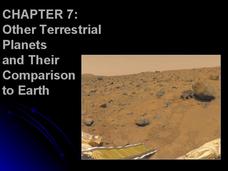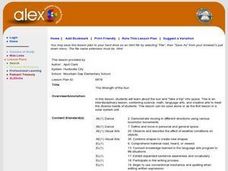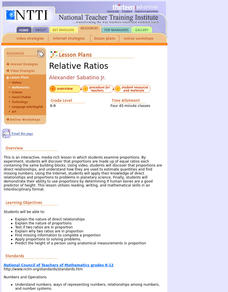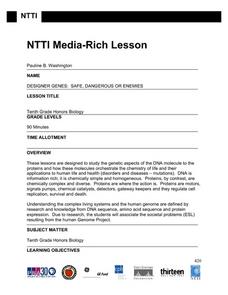Curated OER
The Sun-Earth Connection
Third graders research about the location of different planets from the sun. For this earth science lesson, 3rd graders discuss the weather in their place and identify common weather terminologies. They explain how tornadoes form and...
Curated OER
Planet Fractions and Scales
In this planets and fractions worksheet, students solve nine problems about the sizes and scales of planets compared to each other using fractions.
Curated OER
Exploring Magnetism in Solar Flares
Students apply concepts of magnetism to help them understand the production of solar flares. For this solar flare lesson, students complete activities and graphic organizers to help them learn about magnetic fields on the surface of the...
Curated OER
Solar Box Cooker
Students explore solar power. In this solar power lesson, students build simple solar cookers after they study convection, conduction, and radiation. Students transfer their knowledge of how the solar cooker works to climate changes on...
Curated OER
Mission Impossible! Are We Alone in the Universe, or Are We Just One of Its Citizens?
Students examine NASA strategy for scientifically studying any celestial body. They brainstorm about all previous space explorations and missions they can recall, and propose an expedition plan to become space explorers of the future.
Curated OER
Meteor, Meteoroid, Meteorite: What's the Difference?
Students explore the difference between a meteor, meteorite and meteoroid. In this space science lesson, students first read information about these space bodies. Students make Comet Cookies and use them to model a meteor shower with a...
Curated OER
Our Amazing, Powerful Sun
Learners examine where energy comes from and how it can be used. In this solar energy lesson students explore different aspects of the sun.
Teach Engineering
The Temperature Effect
How temperature affects the efficiency of a solar panel is the focus of the third in a series of eight resources that presents how engineers are able to control the temperatures of photovoltaic panels. Class members find out how the...
Space Awareness
Sun, Earth and Moon Model
The moon orbits Earth while the Earth is rotating, and the Earth revolves around the sun. This can be a tricky concept for young astronomers. Implement an activity that helps distinguish between the movements of Earth's systems around...
American Museum of Natural History
What Do You Know About Astronomy
Develop an understanding of the universe. Learners answer 10 multiple choice questions about several topics in astronomy. Questions contain information about the age of the universe, gravitational attraction, galaxies, planets and comets...
Glynn County School System
Milky Way Galaxy
There is more about the Milky Way that scientists don't know than what they do know—that leaves a lot to discover! A thorough lesson presentation explores the components of the Milky Way Galaxy and their behaviors.
Glynn County School System
Terrestrial Planets
Mercury, Venus, Earth, and Mars are collectively known as the terrestrial planets. Although part of the same group, each planet has its own set of characteristics. Scholars explore the characteristics that make the planets unique and...
Glynn County School System
The Moon
People may not be able to jump over the moon, but scientists can still study it! The moon is covered with mons (mountains) and mars (seas). Aspiring astrologists learn about the moon's features and phases in a PowerPoint presentation. In...
CK-12 Foundation
CK-12 Earth Science Concepts for Middle School
Explore a variety of science concepts in an interactive textbook created for middle school scholars. A lengthy table of contents takes readers to pages comprised of a subject overview, outline, and summary. Follow links further to find...
Curated OER
Solar Kit Lesson #7 Positioning Solar Panels I: Explorations with Tracking
Students track and record data on the Sun's position in the sky and on the output of a solar panel tracking the Sun. On a second day, students graph and analyze the data to identify relationships between (1) the time of day, (2) the...
Curated OER
Feeling Hot, Cold, and Wet: Here Comes the Sun
Students explore the sun through a variety of fine arts activities. In this weather instructional activity, students pantomime sunny day activities as a flashlight is used to represent the sunlight. A bibliography of related books and...
Curated OER
Spaced Out
Pupils explore the transit of Venus and the information that this minieclipse provides about the distance between the Earth and the sun. They create their own astronomical units.
Curated OER
The Best of the Solar System (Grades 4-7)
Learners explore planetary research and become familiar with the planets and their characteristics. They compare and contrasts planets and moons.
Alabama Learning Exchange
The Strength of the Sun
Students explore the sun and take a "trip" to outer space.
Curated OER
High in the Sky
Sixth graders explore the concept of constellations. In this constellations lesson, 6th graders research Internet and print sources regarding constellations, particularly those that are named for mythological creatures. Students compose...
Curated OER
Relative Ratios
Learners discover that proportions are made up of equal ratios each containing the same building blocks. They, using the Internet, apply their knowledge of direct relationships and proportions to problems in planetary science.
Curated OER
The Reasons for the Season
Students explain the reason for the changes in season. In this instructional activity examining the relationship between the Earth and the Sun, students use an applet to discover how the alignment of the Earth and the Sun cause the...
Curated OER
Heat Transfer
Students examine heat transfer using energy efficient houses. In this heat transfer lesson students calculate the heat that is transferred between a system and its surroundings.
Curated OER
Temperature and the Tomato
You will need a photovoltaic system and monitor at your school in order to obtain all of the data required to thoroughly implement this lesson. Your class monitors daily temperature and insolation amounts over a two week span of time....

























